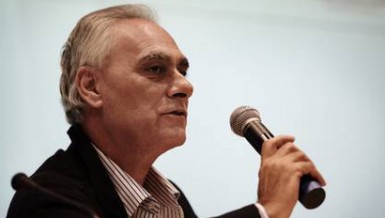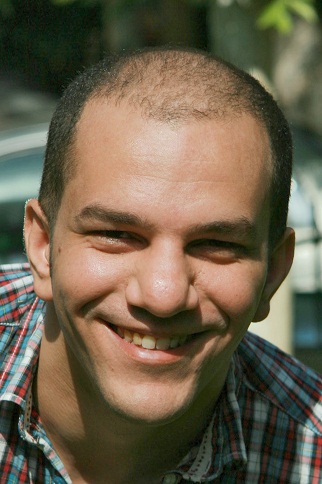
By James M. Dorsey
Turkish Prime Minister Tayyip Recep Erdogan, fresh from a resounding victory in municipal elections, has chosen the football pitch to make good on his promise to “enter the lair” of his Islamist rival, self-exiled preacher Fethullalh Gulen, and ensure that what he calls an “alliance of evil” is brought to account for alleged treason and creating a state within a state.
In a symbolic gesture, Mr Erdogan called on Turkish football legend Hakan Sukur to resign from parliament after his nameplate was removed from an Istanbul’s Sancaktepe Hakan Sukur Stadium. Mr Sukur represented Istanbul on behalf of Mr Erdogan’s Justice and Development Party (AKP) until he resigned in protest again the government’s handling of a major corruption scandal.
Back in 2011, Mr Erdogan, a former football player, recruited Mr Sukur to boost his election campaign to become prime minister for a third term. The former player had supported the prime minister’s effort a year earlier to change Turkey’s constitution that had been drafted in the 1980s during a period of military rule. “Turkey has experienced a tremendous development and I wanted to be a part of this progress and transformation, too. I love my country and I am part of a party that has gained large support,” Mr Sukur said at the time.
Three years later, responding to the renaming of the stadium, Mr Sukur quipped on Twitter: “It is better to have your name in people’s heart than having a picture on a wall.”
AKP won last month’s municipal elections despite a massive corruption scandal that was sparked in December when prosecutors believed to be close to Mr Gulen launched an investigation into alleged graft by ministers and prominent businessmen. Police at the time detained sons of three ministers and the head of a state-owned bank.
Mr Erdogan has accused Mr Gulen, who heads one of the world’s largest Islamist movements, of leaking a string of audio tapes allegedly implicating senior government officials, including Mr Erdogan, in the scandal as well as of a high level security meeting on Syria. The prime minister charged that the graft inquiry was part of a parallel state seeking to topple the government. Mr Gulen is believed to have had a strong following in the judiciary and the police force.
In response to the leaking of the tapes, Mr Erdogan sought to block Twitter and You Tube, but was rebuffed by the courts, which lifted the ban on Twitter unconditionally and ordered You Tube to be unblocked once it deleted the Syria-related video, because it damaged national security.
The move against Mr Sukur, viewed as the best football player of his generation if not in Turkish football history, seemed petty against the prime minister’s earlier moves again Mr Gulen, which included shifting scores of judicial personnel and thousands of police officers into new jobs in a bid to control the corruption investigation.
In addition to the renaming of the stadium, police in the south-eastern city of Adana arrested eight police officers believed to be close to Mr Gulen’s Hizmet or Service movement on charges of illegal wiretapping.
Mr Gulen heads a global education, banking and media empire that allied itself with Mr Erdogan’s AKP in a successful bid to submit Turkey’s powerful military to civilian control. The mounting power struggle first became apparent in 2011 in a political and legal battle between Messrs Erdogan and Gulen over how to handle the eruption of the worst match fixing scandal in Turkish history. The match fixing inquiry was initiated by the same prosecutor who launched the graft investigation.
Messrs Erdogan and Gulen fought a proxy battle over legal penalties for match fixing when the football scandal erupted. Mr Erdogan won that battle by pushing through parliament a bill that significantly reduced the penalties and arm twisting the Turkish Football Federation (TFF) to get Fenerbahce SK, the political crown jewel in Turkish football, off the hook and prevent clubs guilty of match fixing from being relegated. At stake in the battle over Fenerbahce was control of the club with its millions of supporters.
The battle as well as the escalation of the power struggle culminating in the graft investigation has raised doubts about whether Mr Gulen, a frail, ailing 73-year old, who lives in self-exile in Pennsylvania, is in full control of his movement.
Those doubts have risen given that Mr Gulen’s movement turned the power struggle into open warfare with the graft investigation without an apparent clear endgame. The movement appeared unprepared for whatever the outcome would be, a fall of the Erdogan government, which it has not prompted, or government retaliation that would seek to seriously weaken it.
Mr Gulen appeared to implicitly acknowledge that he may not be in control in two phone calls to Fenerbahce chairman Aziz Yildirim in 2011, prior to football boss’s conviction on match fixing charges. People familiar with the phone calls quote Mr Gulen as telling Mr Yildirim: “There is nothing bad in my heart against you. I am not involved in this. There might be people who did wrong against you but I am not aware of this if it was my people.”
In an inscription in a book Mr Gulen sent to Mr Yildirim in between the two phone calls, the preacher wrote: “To Aziz Bey whom I never had a chance to meet but admire for his activism, righteousness and perseverance. My prayers are with you that your difficult days may pass.”
The renaming of the Istanbul stadium to punish Mr Sukur is likely to be but a mild first push in Mr Erdogan’s retaliation. So are allegations by Gulen-owned Turkish media such as Cihan news agency and Zaman newspaper – both affiliated to Gulen that they suffered cyber-attacks during last month’s elections.
Fenerbahce is certain to figure in Mr Erdogan’s campaign. The club emerged in the run-up to the municipal elections as a bastion of opposition against Mr Erdogan’s increasingly authoritarian rule.
The club appeared to highlight its position in a tweet that said that Mr Yildirim had written in his personal notebook an oath of allegiance to Mustafa Kemal Ataturk, the visionary who carved modern Turkey out of the ruins of the Ottoman empire: “I promise you, Fenerbahce will be the last light on earth fighting against the darkest powers that want us to forget your revolution.”
James M. Dorsey is a Senior Fellow at the S. Rajaratnam School of International Studies (RSIS), Nanyang Technological University. He is also co-director of the University of Würzburg’s Institute for Fan Culture, and the author of The Turbulent World of Middle East Football blog and a forthcoming book with the same title.


